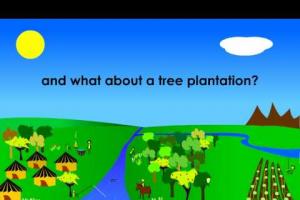Animation about the differences to local people between a forest and a tree plantation.
Large-Scale Tree Plantations
Industrial tree plantations are large-scale, intensively managed, even-aged monocultures, involving vast areas of fertile land under the control of plantation companies. Management of plantations involves the use of huge amounts of water as well as agrochemicals—which harm humans, and plants and animals in the plantations and surrounding areas.
Bulletin articles
30 August 2009
While for the majority of humanity climate change spells disaster, a few corporate-minded people perceive it as a good business opportunity. The way they see it, climate change is about carbon emissions and carbon can be traded as a commodity in the global market. This market – so they say – can be worth billions or even trillions of dollars and they expect it to bring them huge profits.
Bulletin articles
30 August 2009
In mid-July the Clean Development Mechanism (CDM) Executive Board accepted a new methodology proposed as part of the controversial Plantar project in Minas Gerais, Brazil (see background on Plantar on WRM bulletins 84,http://www.wrm.org.uy/bulletin/84/Plantar.html, 70 and 72).
Bulletin articles
30 August 2009
The UK-based New Forests Company is establishing tree plantations in Uganda, Mozambique and Tanzania. The company states that “Whilst based on commercial forestry economics, our projects are underwritten by carbon credits … in compliance with the Clean Development Mechanism. This means that its profits from the sale of wood will be increased by selling “carbon credits” to polluting industries in the North.
Bulletin articles
30 August 2009
Forests are big news these days. Preventing deforestation will help us address climate change (at least if the carbon stored in the forests isn't traded, allowing emissions to continue elsewhere). Yet forests have never been under such serious threat.
Bulletin articles
30 August 2009
For over a decade, the World Rainforest Movement has been denouncing that -by certifying large scale tree plantations- the FSC is greenwashing the destructive activities of plantation companies in Southern countries (for further information seehttp://www.wrm.org.uy/actors/FSC/index.html).
Bulletin articles
30 August 2009
The indigenous people of Teluk Meranti in the Kampar Peninsula, Riau, Sumatra, are resisting efforts by a pulp and paper company to take over their customary lands.
Bulletin articles
30 August 2009
An internal audit has revealed that the World Bank’s private sector arm – the International Finance Corporation (IFC) – has allowed commercial interests to override its social and environmental standards in making major loans to the oil palm sector in Indonesia.. The uncontrolled expansion of oil palm plantations in Indonesia has become synonymous with widespread clearance of forests and peatlands, massive CO2 emissions and the theft of indigenous peoples’ lands.
Bulletin articles
30 August 2009
On the World Indigenous Peoples Day – 9th August 2009 – the Malaysian Indigenous Peoples Organisations Coalition called on for Malaysian State governments “to stop large-scale plantations and other extractive activities on our customary lands until effective measures to safeguard our rights and the environment are in place”.
Other information
17 August 2009
Listen to Hightower's commentary
Here’s a great idea: Let's bring into our country a genetically-engineered, non-native tree that is known to be wildly invasive, explosively flammable, and insatiably thirsty for ground water. Then let's clone thousands of these living firecrackers and plant them in forested regions across seven Southern states, allowing them to grow, flower, produce seeds, and spread into native environments.
Other information
30 July 2009
On 9 July 2008 the Brazilian Senate adopted a provision by the Executive known as a “provisional measure,” subject to the subsequent approval of the Legislative. The provision has been harshly questioned by environmentalists and various political and social sectors in Brazil, including the former Minister of the Environment, Senator Marina Silva.
Bulletin articles
30 July 2009
One year ago, Judson Barros, Coordinator of the Piaui Environmental Network stated that “the south of Piaui has been destroyed, its rivers and streams poisoned to satisfy the voraciousness of some companies that seek easy profit through the destruction of ecosystems, with their coal, soybean, timber, castor-oil and eucalyptus activities. The wealth produced remains in the hands of a few people, while most of the population continues living but not enjoying the assets offered for free by Mother Nature.


